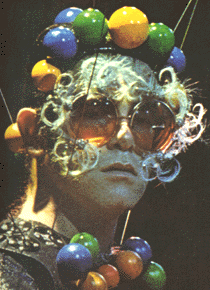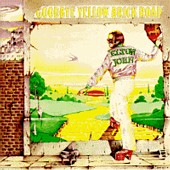|
"I'm a title freak," explained Bernie. "My usual method of writing is by titles. If I come up with a really good title, then I'll build a song around it. I'll be walking down the street, or in the bath, scrubbing my back. I'll think of a line and say, 'Now that's good. I'll have to build a song around it.' Or, I'll just think of a subject."
In 1974, there was one subject that Bernie and Elton could hardly keep from thinking about, and that was the worldwide record industry. As the hottest single performer of the seventies, Elton got to witness and experience far more of the multifaceted music scene than nearly any other participant. He was, at once, a pop fan, record collector, record producer, performer, singer, songwriter, spokesman, musician, actor, and owner-director of his own label (Rocket Records). He was also, to millions, the logical successor to Elvis Presley and the Beatles -- a kind of bizarre but beloved musical messiah. Heady stuff. "Pop music is fun," laughed Elton, "and there's only one way to keep your sanity in it. Don't take yourself seriously. I don't. I love pop music. It's my whole life. I love it because it is fun. People say, 'Why do you wear flamboyant clothes, and why do you do this and that?' It's fun! I mean, I really have a ball dressing up, wearing the crazy clothes. But there's one thing I do take seriously, and that's the quality of the music. The music has to be there." With their every waking hour steeped in pop music culture, it's logical that eventually Elton and Bernie would come up with a song that commented on all the craziness. They did -- a tune that Elton described as "one big hook. The strangest cut on the album Goodbye Yellow Brick Road -- I think I sound like Frankie Valli on the song."
That was in February 1974. By April, "Bennie and the Jets" was a gold record, and America's number-one hit, both pop and R&B. Elton helped that along by visiting both kinds of deejays, and making a rare TV appearance on the dance show, "Soul Train." "Bennie and the Jets" clung to the charts for more than four months, selling over two million copies. The album it was off didn't do too poorly, either. Goodbye Yellow Brick Road remained in the LP Top 10 for three-quarters of the year. "It is like the ultimate album for me," said Elton. "It takes in everything I've ever written, or sounded like. Now I've got to start all over again." To help get things rolling, Elton renegotiated his contract with MCA. He walked away with an $8 million deal the largest figure ever given to a record artist to that time.
No comments so far, be the first to comment. |


